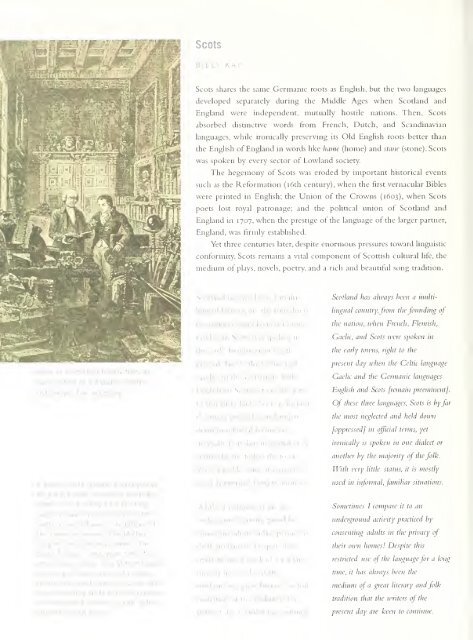SCOTLAND - Smithsonian Digital Repository - Smithsonian Institution
SCOTLAND - Smithsonian Digital Repository - Smithsonian Institution
SCOTLAND - Smithsonian Digital Repository - Smithsonian Institution
You also want an ePaper? Increase the reach of your titles
YUMPU automatically turns print PDFs into web optimized ePapers that Google loves.
.<br />
Scots<br />
KAY<br />
Scots shares the same Germanic roots as<br />
Enghsh, but the two languages<br />
developed separately during the Middle Ages when Scotland and<br />
England were independent, mutually hostile nations. Then, Scots<br />
absorbed distinctive words from French, Dutch, and Scandinavian<br />
languages, while ironically preserving its<br />
Old English roots better than<br />
the English of England in words like hame (home) and stniie (stone). Scots<br />
was spoken by every sector of Lowland society.<br />
The hegemony of Scots was eroded by important historical<br />
events<br />
such as the Reformation (i6th century), when the first vernacular Bibles<br />
were printed in Enghsh; the Union of the Crowns (1603), when Scots<br />
poets lost royal patronage; and the political union of Scotland and<br />
England in<br />
1707, when the prestige of the language of the larger partner,<br />
England, was firmly established.<br />
Yet three centuries later, despite enormous pressures toward linguistic<br />
conformity, Scots remains a vital component of Scottish cultural life, the<br />
medium of plays, novels, poetry, and a<br />
rich and beautiful song tradition.<br />
SccitKuid lies aye bcL'n a ii' !!;<br />
Scotlniid hiis alwctys hcvn a imtlti-<br />
Imgu.il kintrao. fao the touiidiii<br />
o<br />
lingual country, front<br />
the founding of<br />
Scots in a Scottisli nuidry from an<br />
early edition of Sir Walter Scott's<br />
1816 novel The Antiquary.<br />
die natioun wiian f-rcncli. Fleniisli.<br />
Ciaelic, an Scots ucs spoken m<br />
tin- early burghs, riclit t.ic tlie<br />
present day wi tiie C'eitic leid<br />
(iaeiu an the (Icrni.inic leids<br />
IZnglisli an Scots yet t.ie tiic tore.<br />
O tliir thne Iculs. Scots is by t.iiir<br />
the nation, when French, Flemish,<br />
GaeUc, and Scots were spoken in<br />
the early toii'ns, right to the<br />
present day when the Cchic language<br />
Gaelic and the Germanic languages<br />
Enghsh and Scots (remain preeminent j<br />
Of these three languages, Scots is by far<br />
tlu-<br />
ni.nst nogleckit an iiaiidcn<br />
the most neglected and held down<br />
A native Scots speaker from Ayrshire,<br />
Billy Kay's work promoting Scots has<br />
been a major catalyst for the language's<br />
revival in education and the<br />
media in recent years. He produced<br />
the television series "The Mother<br />
Tongue" and the radio series "The<br />
Scots Tongue," and wrote the influential<br />
book. Scots, Tlie Mithier Tongue.<br />
He has published successful plays,<br />
poetry, and short stories in Scots and<br />
also frequently visits Scottish primary<br />
and secondary schools to talk to the<br />
students about Scots.<br />
(.loiiii m offeicial terms, yet<br />
nxinicallv is spoken in ae ilialcct or<br />
•inither by the feck o tiie t'owk.<br />
Wi gev pickle status, it is niaisdy<br />
uiscd in mfonual, f.imiliar situations.<br />
Whiles 1 lonipare it t.ie an<br />
uiideigrund actix-iry pieed by<br />
conscntm adults in the pnv.uy o<br />
their am hames! Despite this<br />
lestrictit uis o the leid tor a King<br />
nine, it ties .i\'e been the<br />
niedium a a great literary an toik<br />
tradeition .it the makars o the<br />
praisent day is eident tae continue.<br />
[oppressed] in official terms, yet<br />
ironically is spoken in one dialect or<br />
another by the majority of the folk.<br />
With very little status, it is mostly<br />
used in informal, fmiiliar situations.<br />
Sometimes I compare it to an<br />
underground activity practiced by<br />
consenting adults in the privacy of<br />
their own homes! Despite this<br />
restricted<br />
use of the language for a long<br />
time, it has always been the<br />
medium of a great literary and folk<br />
tradition that the writers of the<br />
present day are keen to continue.
















